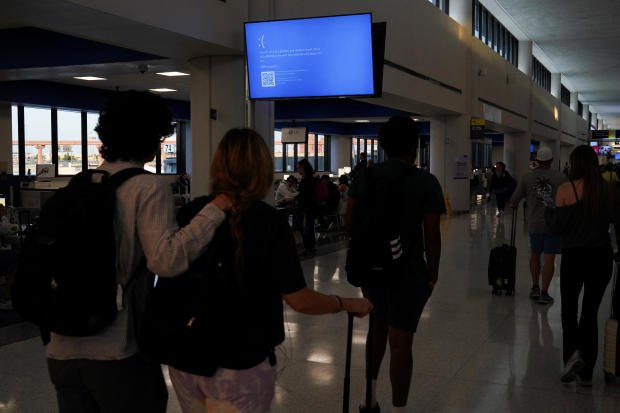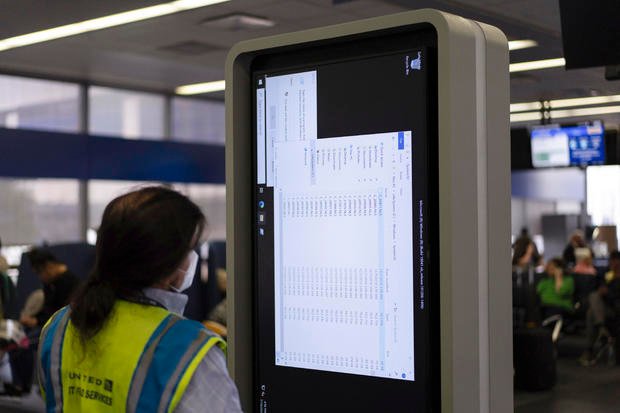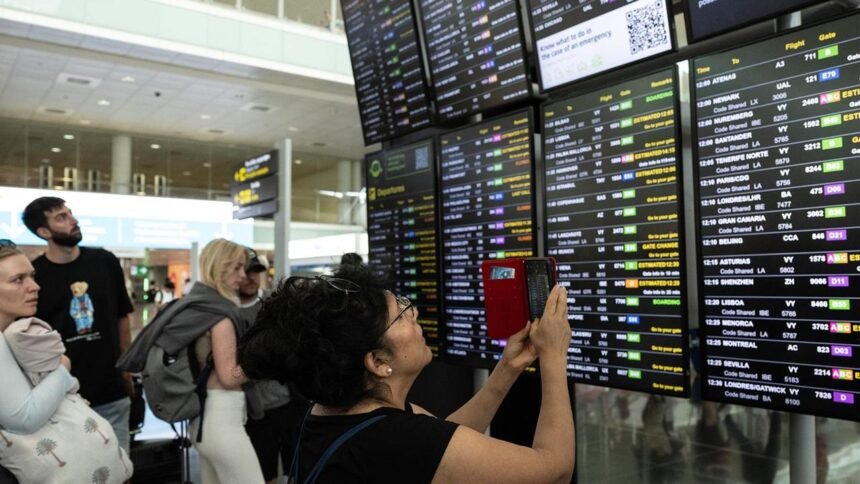Transport providers, businesses, and governments are scrambling to get their systems back online following extensive disruptions caused by a widespread technology outage.
The most significant impact has been on air travel. Airlines canceled thousands of flights on Friday, leaving many planes and crews out of position and causing continued issues with check-in and security at airports. As of around 12 p.m. EDT on Saturday, flight-tracking service FlightAware reported approximately 23,000 flight delays.
At the center of this massive disruption is CrowdStrike, a cybersecurity firm whose faulty update to Microsoft Windows computers caused the outage. CrowdStrike confirmed that the problem was not a security incident or cyberattack.
The faulty update led to the reappearance of the infamous “blue screen of death” for many Windows users, signaling that their computer systems were down.
The outage has affected consumers and businesses worldwide, including airlines, banks, healthcare providers, telecoms, retailers, and even billboards in New York City’s Times Square.
In a blog post on Saturday morning, Microsoft stated it is working with CrowdStrike to develop a solution, sharing instructions on how to fix the issue, and deploying “hundreds of Microsoft engineers and experts to work directly with customers to restore services,” among other efforts to keep people informed and assist affected customers.

Here’s the latest:
Britain’s Transport System Still Trying to Get Back on Track
LONDON — Britain’s travel and transport industries are struggling to resume normal operations after the global security outage, with airline passengers facing cancellations and delays at the start of the summer holidays for many school pupils.
Gatwick Airport reported that “a majority” of scheduled flights were expected to take off. Manchester Airport noted that passengers were being checked in manually, potentially leading to last-minute cancellations.
The Port of Dover reported an influx of displaced air passengers, causing hour-long waits to enter the port for ferries to France.
Meanwhile, Britain’s National Cyber Security Center has warned people and businesses to be cautious of phishing attempts by “opportunistic malicious actors” taking advantage of the outage.
Ciaran Martin, former head of the National Cyber Security Center, stated that the worst of the crisis is over, as the problem was identified and halted quickly. He added that while some businesses might return to normal swiftly, it will take longer for sectors like aviation.
“If you’re in aviation, you’ve got people, planes, and staff all stranded in the wrong place… So we are looking at days. I’d be surprised if we’re looking at weeks.”
Germany Airline Expects Most of Its Flights to Run Normally
BERLIN — Eurowings, a budget subsidiary of Lufthansa, expects to return to “largely scheduled” flight operations on Saturday.
On Friday, the global IT outage forced the airline to cancel about 20% of its flights, primarily on domestic routes. Passengers were advised to take trains instead.
“Online check-in, check-in at the airport, boarding processes, booking and rebooking flights are all possible again,” the airline said on X. “However, due to the considerable extent of the global IT disruption there may still be isolated disruptions” for passengers, it added.
Delta Air Lines and Its Regional Affiliates Have Canceled Hundreds of Flights
DALLAS — Delta Air Lines and its regional affiliates canceled more than a quarter of their schedule on the East Coast by midafternoon Friday, according to aviation data provider Cirium.
More than 1,100 flights for Delta and its affiliates have been canceled. As of Saturday afternoon, about 40% of Delta’s mainline flights were delayed, with another 25% canceled. Approximately 40% of regional flights have been canceled, with Georgia’s Hartsfield–Jackson Atlanta International Airport being the epicenter of the disruption.
About half of United Airlines’ flights were delayed on Saturday afternoon, with another 15% canceled. The airline’s hub airport in Houston is experiencing the worst delays.
American Airlines canceled 450 flights, 7.5% of its schedule, and is viewing Saturday as a recovery day.
Southwest and Alaska Airlines, which do not use the CrowdStrike software that caused the global internet outages, canceled fewer than half a dozen flights each.
Portland, Oregon, Mayor Declares an Emergency Over the Outage
PORTLAND, Ore. — Mayor Ted Wheeler declared an emergency on Friday after more than half of the city’s computer systems were affected by the global internet outage.
During a news conference, Wheeler stated that while emergency services calls were not interrupted, dispatchers had to manually track 911 calls with pen and paper for a few hours. He said 266 of the city’s 487 computer systems were affected.
Border Crossings Into the U.S. Are Delayed
SAN DIEGO — People attempting to enter the U.S. from both the north and south experienced delays due to the internet outage.
The San Ysidro Port of Entry was gridlocked Friday morning, with pedestrians waiting three hours to cross, according to the San Diego Union-Tribune.

Even cars with travelers approved for the U.S. Customs and Border Protection “Trusted Traveler” program faced up to 90-minute waits. The program, known as SENTRI, allows low-risk passengers to pass through customs and passport control more quickly if they make an appointment for an interview and undergo a background check.
Meanwhile, at the U.S.-Canada border, Windsor Police reported long delays at the Ambassador Bridge and the Detroit-Windsor tunnel crossings.










